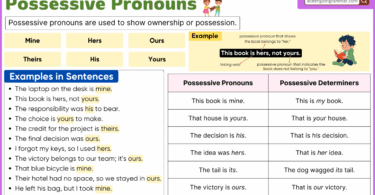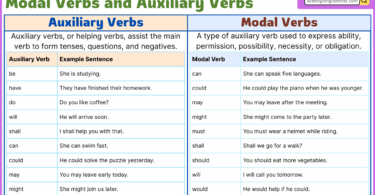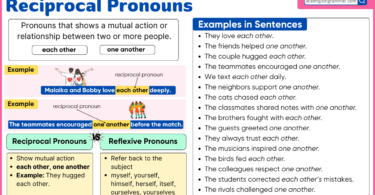Conditional sentences are an important part of English grammar. They express hypothetical situations, conditions, or an uncertain event that may or may not happen. These sentences often have an ‘if’ clause that contains a condition, followed by a main clause that describes the possible result of that condition. There are four main types of conditional sentences (Zero, first, second, and third conditionals), each with its unique structure, rules, and meanings. Whether you are a beginner or an advanced English learner, understanding conditional sentences is crucial for effective communication. So let’s take a closer look at each type with some examples to better understand how they work.
Table of Contents
What Are Conditional Sentences?
Conditional sentences are a type of sentence that expresses a particular condition or situation that should be met in order for another event or situation to happen. In other words, they show that if you do the first thing or if the first thing happens, the second thing will definitely happen as a result. It’s like saying, “If you do this, then that will happen for sure.” For example, if you study hard (the first part), you will pass the exam (the second part is almost guaranteed). They are used to convey possibilities, hypothetical situations, predictions, cause-and-effect relationships, and more. These sentences consist of two main clauses: the if-clause, which introduces the condition, and the main clause, which presents the result or consequence. Here’s a basic structure for conditional sentences:
If-Clause (Condition) + Main Clause (Result/Consequence)
Example:
- If it rains, I will stay at home.
In this example, the if-clause is “If it rains,” and the main clause is “I will stay at home,” which indicates that if the condition (rain) occurs, the result (staying at home) is likely to happen.
Types of Conditional Sentences
Conditional sentences can be categorized into four main types: Zero Conditional, First Conditional, Second Conditional, and Third Conditional. Each type serves a different purpose and is used in various contexts.
- Zero Conditional
- First Conditional
- Second Conditional
- Third Conditional
Zero Conditional (Real Condition):
Structure: If + Present Simple, Present Simple
Usage: Used for general truths or facts, when the condition is always true.
Tense: Present simple in both clauses.
The zero conditional is used to express general truths, facts, or scientific principles. It often employs the present simple tense in both the “if” clause and the main clause. Here are a few examples:
Examples:
- If you mix red and blue, you get purple. (General truth.)
- If you heat water to 100 degrees Celsius, it boils. (Scientific fact.)
- If the sun sets, it gets dark. (General truth.)
In these examples, the conditions are facts that always lead to the same result. There is no uncertainty involved.
First Conditional (Possible Condition):
Structure: If + Present Simple, Will + Base Form
Usage: Used for future situations that are likely to happen.
Tense: Present simple in the “if” clause and “will” + base form of the verb (Future simple) in the main clause.
First conditionals are used to talk about future possibilities, predictions, and real-life situations. In this type, the “if” clause is in the present simple tense, and the result clause is in the future simple tense. Here are some examples:
Examples:
- If it stops raining, we will go for a walk.
- If you study hard, you will pass the exam.
- If you call me later, I will answer.
In these cases, the result is expected if the condition is met. The first conditional expresses events that are expected to happen or are quite likely to occur in the future, which makes the first conditional suitable for discussing real-life scenarios.
Second Conditional (Unlikely or Imaginary Condition):
Structure: If + Past Simple, Would + Base Form
Usage: Used for hypothetical or unlikely situations in the present or future.
Tense: Past simple in the “if” clause and “would” + base form of the verb in the main clause.
The second conditional is used for hypothetical, unlikely, or imaginary situations, often associated with wishes, desires, or unreal possibilities. In this type, the “if” clause is in the past simple tense, and the result clause is in the conditional (would + base form of the verb). Here are a few examples:
Examples:
- If I were you, I would take that job offer.
- If I had more money, I would buy a new car.
- If it didn’t rain so much, we would have a picnic.
Second conditionals are employed for expressing desires, wishes, and scenarios that are often hypothetical or contrary to reality and are not expected to happen.
Third Conditional (Unreal Condition in the Past):
Structure: If + Past Perfect, Would Have + Past Participle
Usage: Used for unreal or hypothetical situations that did not happen in the past.
Tense: Past perfect in the “if” clause and “would have” + past participle in the main clause.
Third conditionals are used to talk about past events that did not occur. They express regret or disappointment over missed opportunities or the unreal past. In this type, the “if” clause is in the past perfect tense, and the result clause is in the conditional perfect (would have + past participle). Here are some examples:
Example:
- If I had known about the party, I would have come.
- If she had studied harder, she would have passed the exam.
- If she had called me, I would have helped her.
These conditions talk about past events that did not occur but discuss the hypothetical results if they had. They are particularly useful for discussing past regrets or things that could have happened differently.
Mixed Conditionals
In addition to the four main types of conditional sentences, there are also mixed conditionals. These combine elements of different conditional types to express complex ideas about the relationship between past, present, and future. For example, you might use a first conditional in the “if” clause and a second conditional in the result clause.
- If I had studied harder (third conditional), I would be more confident now (second conditional).
This mixed conditional sentence combines a past unreal condition with a present hypothetical result.
- If I had known you were coming (third conditional), I would have baked a cake (second conditional).
Here, the first part uses the past unreal condition (third conditional), while the second part uses the hypothetical result (second conditional).
Common Uses of Conditional Sentences:
Conditional sentences serve various functions in English, making them crucial for effective communication. Here are some common uses:
Expressing Possibility: Conditional sentences are ideal for discussing possible outcomes, whether they are likely or not.
Example: If he studies hard, he may get a scholarship.
Giving Advice: They can be used to offer suggestions or recommendations.
Example: If you’re feeling tired, you could take a nap.
Making Requests: Conditional sentences can be used to make polite requests or ask for help.
Example: If you could pass me the salt that would be great.
Expressing Regret: Third conditionals help express regret about past actions or events.
Example: If I could turn back time, I would change some things.
Describing Hypothetical Scenarios: Second conditionals allow you to talk about unreal or unlikely situations.
Example: If I were a superhero, I would save the world.
Speculating on the Future: First conditionals are useful for discussing future possibilities.
Example: If they finish the project on time, they will receive a bonus.
Stating Facts: Zero conditionals help convey general truths or scientific facts.
Example: If water freezes, it turns into ice.
Common Mistakes to Avoid:
While using conditional sentences, there are some common mistakes to watch out for:
- Mixing tenses: Ensure that you use the correct verb tense in the “if” clause and result clause to match the intended meaning. For example, in the first conditional, the if-clause is in the present simple tense, and the main clause uses “will” with the base form of the verb.
- Maintaining Consistency: Use the appropriate conditional type for the context. Don’t mix different conditional types in the same sentence.
- Neglecting modal verbs: Proper use of modal verbs (will, would, could, should) is essential to convey the intended meaning in different conditional sentences.
- Avoiding Double Negatives: Double negatives can make sentences confusing. Keep your statements clear and concise.
- Misplacing the comma: A comma is often used to separate the if-clause from the main clause. Make sure it’s in the right place to maintain clarity.
- Subject-Verb Agreement: Ensure that the verb forms in your conditional sentences agree with the subject. In the First Conditional, the subject takes a simple present tense verb.
- If she study hard, she will pass the exam. ❎
- If she studies hard, she will pass the exam. ✅
Example Sentences:
Zero Conditional (Factual/General Truth):
- If you heat water to 100°C, it boils.
- When the sun sets, it gets dark.
- If you mix red and blue, you get purple.
- When it rains, the ground gets wet.
- If you press this button, the light turns on.
First Conditional (Real Possibility):
- If it rains tomorrow, we will stay home.
- If you need help, call me.
- I’ll go for a walk if I finish my work early.
- If she calls, tell her I’m in a meeting.
- If you study hard, you’ll pass the exam.
Second Conditional (Unreal/Hypothetical):
- If I were a bird, I would fly in the sky.
- If I won the lottery, I would buy a big house.
- If I were you, I would take the job.
- If it were sunny today, we could go to the beach.
- If she were here, she would help us with the project.
Third Conditional (Unreal Past Condition):
- If they had studied, they would have aced the test.
- If I had known, I would have come to the party.
- If he had listened to my advice, he wouldn’t be in trouble now.
- If we had caught the earlier train, we wouldn’t have missed the flight.
- If she had practiced, she could have won the competition.
Mixed Conditionals
- If I had your number, I would call you.
- If I were taller, I could reach that shelf.
- If they had the ingredients, they’d make a delicious cake.
- If you eat ice cream, you’ll feel better.
- If he studied more, he would have better grades.




Leave a Comment